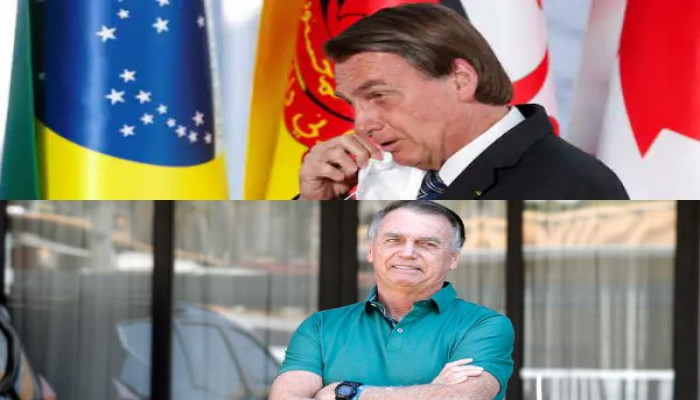Former President Bolsonaro sentenced to 27 years for coup attempt in Brazil
- In Reports
- 07:46 PM, Sep 12, 2025
- Myind Staff
Jair Bolsonaro, the former President of Brazil, was sentenced on Thursday to 27 years and three months in prison after the nation’s Supreme Court found him guilty of trying to stage a coup to remain in office following his defeat in the 2022 election.
This was not the first time Brazil convicted a former President, but it was the first time an ex-leader was charged with coup-related crimes, even though the country has witnessed at least 15 coups or attempted coups since the monarchy ended in 1889.
It is a "watershed moment in Brazil’s history," Chief Justice Luís Roberto Barroso said after the verdict.
The ruling deepened political divisions in an already polarised Brazil. The 70-year-old far-right populist has consistently denied plotting to overthrow the government, calling the case political persecution. His supporters poured onto the streets of Brasilia, Rio de Janeiro, and São Paulo in recent days to protest against the verdict and the current government, while in other cities, backers of President Luiz Inácio Lula da Silva staged counterprotests demanding Bolsonaro’s imprisonment and defending Lula.
The verdict also drew a reaction from the United States. Addressing reporters at the White House, President Donald Trump, who has described Bolsonaro as a friend and called his prosecution a "witch hunt," said the Brazilian court’s decision was "surprising."
"I thought he was a good President," Trump said. "It’s very much like they tried to do with me, but they didn’t get away with it at all."
Bolsonaro was often nicknamed the "Trump of the Tropics" because of his similarities with the former U.S. President, who frequently highlighted their friendship and compared their political struggles. Trump himself faced legal battles over alleged election interference after the 2020 U.S. election. While federal charges were dropped, a racketeering case in Georgia remains unresolved.
Trump has also tried to defend his allies abroad, including Bolsonaro and Israel’s Benjamin Netanyahu, from what he calls political persecution. In July, he imposed a 50 percent tariff on Brazilian goods, sanctioned Justice Alexandre de Moraes, who presided over Bolsonaro’s trial, and revoked the U.S. visas of de Moraes, his allies, and family members in an effort to pressure Brazilian authorities.
Bolsonaro’s son, Eduardo, a Brazilian lawmaker on leave, relocated to the U.S. earlier this year to lobby the White House and Republicans to intervene in his father’s case and to avoid facing prison himself.
After the conviction, Secretary of State Marco Rubio attacked de Moraes. "The political persecutions by sanctioned human rights abuser Alexandre de Moraes continue, as he and others on Brazil’s supreme court have unjustly ruled to imprison former President Jair Bolsonaro," he wrote on X. "The United States will respond accordingly to this witch hunt."
Bolsonaro, a former army captain who governed Brazil from 2019 to 2022, was found guilty on five counts, which included attempting a coup after losing to Lula, taking part in an armed criminal organisation, trying to violently abolish the democratic rule of law, damaging government property, and damaging protected property.
The case began after Prosecutor General Paulo Gonet Branco filed charges in February, following a federal police recommendation in November 2024 to prosecute Bolsonaro. Prosecutors accused Bolsonaro and his allies of carrying out a series of actions from 2021 to 2023 to keep him in power. These included discrediting electronic voting machines before the election, and plotting a coup that allegedly involved arresting Supreme Court justices, poisoning Lula, and assassinating Vice President Geraldo Alckmin.
Prosecutors also said that after losing to Lula, Bolsonaro and his team tried to reverse the election results by urging his supporters to gather in Brasília on January 8, 2023, when they stormed and vandalised the main government buildings of the executive, judiciary, and legislature.
During the trial, Bolsonaro denied orchestrating a coup, but admitted that he and his officials had explored constitutionally permitted "alternatives" to remain in office, including deploying military forces and possibly declaring a "state of siege," a measure usually used to restrict civil liberties during crises.
The Supreme Court’s First Panel of five justices heard the case. Justice Alexandre de Moraes, who had previously ordered the shutdown of X in Brazil in 2024 and imprisoned several of Bolsonaro’s supporters, was the first to vote on Tuesday. He said that "the leader of the criminal group makes it clear, in his own voice, publicly, that he would never accept a defeat at the polls, a democratic defeat in the elections, that he would never comply with the people’s will." Justices Carmen Lúcia Rocha, Cristiano Zanin, and Flávio Dino also voted to convict Bolsonaro.
The only justice to dissent was Luiz Fux, who voted to acquit Bolsonaro of all charges. In a speech lasting over 13 hours, Fux argued that there was not enough evidence to convict the far-right leader and that he should not be held responsible for the January 8 attack on government buildings.
Bolsonaro was not the only figure sentenced. Others described by prosecutors as part of the "crucial core of the criminal organisation" were also punished. Lt. Col. Mauro Cid, a senior aide who cooperated with investigators in exchange for leniency, received two years in an "open regime," similar to a halfway house.
Former defence minister and Bolsonaro’s 2022 running mate, Gen. Walter Braga Netto, was sentenced to 26 years. Adm. Almir Garnier Santos, the Navy commander during Bolsonaro’s presidency, was sentenced to 24 years. Gen. Augusto Heleno, former Institutional Security Secretary, received 21 years, and former defence minister Gen. Paulo Sérgio Nogueira was sentenced to 19 years.







Comments